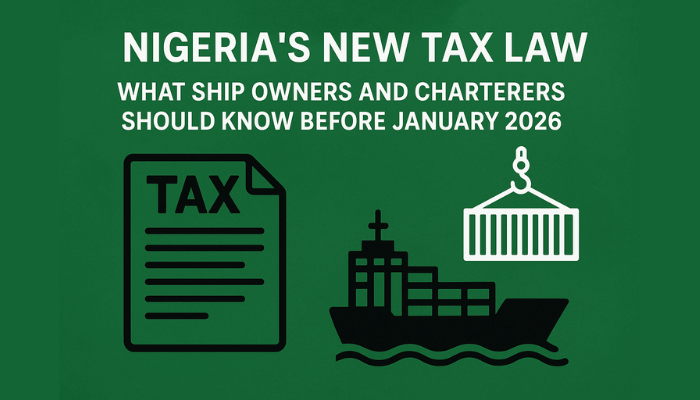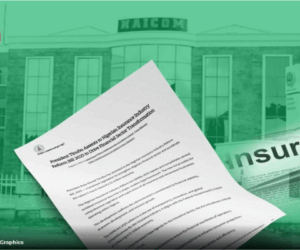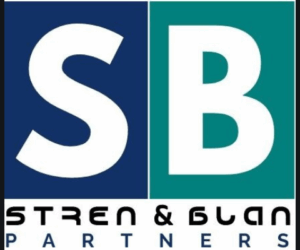On 26 June 2025, Nigeria’s President signed into law a sweeping set of reforms that will fundamentally reshape the country’s fiscal framework. The reforms have sector-wide ramifications. For ships loading from Nigeria, the changes — which take effect from 1 January 2026 — have particular significance. Many in the shipping industry will, by now, have some degree of familiarity with the Nigerian freight tax regime, a topic that has been the subject of much debate over the last two years. The obligations that arose under that regime have been retained but with, arguably, more arduous compliance requirements and expanded enforcement powers.
The reform package comprises four new Acts:
• The Nigeria Tax Act (NTA) 2025,
• The Nigeria Tax Administration Act (NTAA) 2025,
• The Nigeria Revenue Service (Establishment) Act (NRSA) 2025, and
• The Joint Revenue Board of Nigeria (Establishment) Act (JRBA) 2025.
Collectively, these Acts consolidate numerous former laws, repealing many of those laws including the Companies Income Tax Act (CITA), section 14 of which provided the freight tax. For shipping companies with Nigeria loading operations, the NTA 2025 is the focal point, carrying forward — almost word-for-word — the old freight tax provisions.
Freight Tax Retained: 2% minimum
Under section 18 of the NTA, owners of ships remain liable to tax on profits from carriage of goods shipped in Nigeria. The minimum rate remains unchanged at 2% of gross revenue from Nigerian carriage.
Monthly Filing
A crucial revision to the current position is that the tax must be computed, assessed, and paid on a monthly basis .
This raises practical concerns. The shipping industry, and particular trades, are ill-suited to such frequent assessments. Inevitably, some vessels/owners will load in Nigeria only occasionally. It may be unrealistic to require the owners of such vessels to file monthly returns.
The FIRS has indicated that guidance circulars will be issued to address implementation challenges. It is hoped that such guidance will address the practical realities of implementing the freight tax. In this respect, policy makers ought to bear in mind that one of the expressly stated objectives of the new laws is to provide for the efficient administration of tax laws and to promote the rights of taxpayers.
Documentation Requirements: Two Compliance Routes
Section 18(7) of the NTA outlines two possible approaches to documentary compliance:
• Providing a separate financial statement of Nigerian operations.
• If no such statement is submitted, companies must provide detailed gross revenue statements of Nigerian operations, certified by a director and external auditor, and supported by contract agreements.
While the first of these options appears more practical, the law does not specify exactly what a separate financial statement is nor how detailed it should be — leaving companies in uncertainty until further regulatory guidance emerges.
Time-Chartered Vessels: An Unresolved Dilemma?
No more light has been shed on one of the more debated issues under the old regime – i.e. whether the owners of time-chartered ships, receiving hire, are liable to taxes on the hire received.
It remains the authors’ view that the NTA’s freight tax, like its predecessor, clearly targets voyage-chartered vessels, whose owners are paid to carry cargo as contrasted to time chartered vessels whose earning capacity is not, strictly speaking, dependent on the carriage of cargo from one point to another (although, it is worth noting that hire may well be taxable under other provisions of the NTA).
Enforcement: Expanded Powers and Regulatory Leverage
The new framework gives the Nigeria Revenue Service (NRS) unprecedented teeth.
• Distraining ships without court approval: Section 61 of the NTAA arguably allows the NRS to detain vessels where the owner remains in default following an assessment — a power mirrored in the old CITA but never, to our knowledge, exercised. Whether the new, more proactive stance will translate into actual detentions remains to be seen.
• Regulatory cooperation: Section 18(9) of the NTA requires agencies such as the Nigerian Ports Authority (NPA) and the Nigerian Maritime Administration and Safety Agency (NIMASA), and potentially even the Nigerian Navy , to demand tax evidence as a condition for issuing permits or approvals. Given the express provision for such regulatory cooperation, we envisage that this may be an easier tool to deploy by the NRS. Delay in obtaining requisite licence and permissions could cause serious operational disruption for non-compliant companies.
It remains to be seen how the NRS and the regulatory authorities will utilise their newly donated powers. Caution and precision are recommended – the delinquent owner of a ship on one voyage may not be the owner of the same ship when enforcement measures are sought to be imposed. It would be unfair, unjust and unworkable to impose measures on the innocent owner of a ship in circumstances where that ship, on an earlier call to Nigeria, was owned by a different owner who failed to comply with tax obligations. A ship, an inanimate object, cannot pay taxes.
Limitation Period: Narrower Escape Routes
The six-year limitation period remains, but two key changes expand the NRS’s reach:
1. Under the former law, ship owners could arguably claim a 6-year time bar, beyond which the FIRS could not assess or enforce against them. The only exception was where “fraud, wilful default or neglect” was found. This exception of fraud, wilful default or neglect has been taken and replaced with “deliberate misstatement.”
2. Further, where an audit is commenced before the six-year limit expires, the limitation does not apply .
Together, these amendments reduce companies’ ability to challenge assessments on time-barred grounds.
Preparing for the New Regime
Shipping companies should begin preparations immediately. The following steps are recommended:
• Obtain Tax Identification Numbers (TINs).
• Make necessary preparations for monthly filing of returns supported by statements of Nigeria operations.
• Request Tax Clearance Certificates (TCCs) once obligations are satisfied; by law, the NRS must issue these within two weeks .
Companies must also remember that the new laws include “saving provisions” which preserve obligations and liabilities accrued before 1 January 2026 . Past non-compliance is therefore not to be overlooked.
Conclusion
What is clear is that for decades, enforcement of the freight tax was, at best, lax. The lenient approach of the previous decades is unlikely to continue. It remains to be seen just how proactive the newly rebranded Nigerian Revenue Service will be in the enforcement of the new laws. Shipping companies loading from Nigeria are advised to put in place compliance systems well in advance of 1 January 2026 or risk vessel detentions and disrupted operations.
Tunde Adesokan is a Partner at Adesokan & Ajayi
Iyanuoluwa Ajayi is an Associate at Adesokan & Ajayi
NOTES:
1. Strictly speaking, the new laws are not yet “former” as they come into force on 1 January 2026.
2. Section 18(6) of the NTA 2025
3. The Federal Inland Revenue Service is to be renamed the Nigeria Revenue Service.
4. A term which may have various interpretations in the context of a ship
5. To the extent that it can be described as a regulatory agency
6. Section 36(4) of the NTAA
7. Section 36(2) of the NTAA
8. Note there appears to be a contradiction between Section 21 of the NTAA which suggests a detailed gross revenue statement is required and section 18(7) of the NTA, which seems to offer the simpler financial statement of Nigeria operations route. Until clarified, cautious compliance is to be advised.
9. Section 72(1) of the NTAA
10. Section 199 of the NTA






